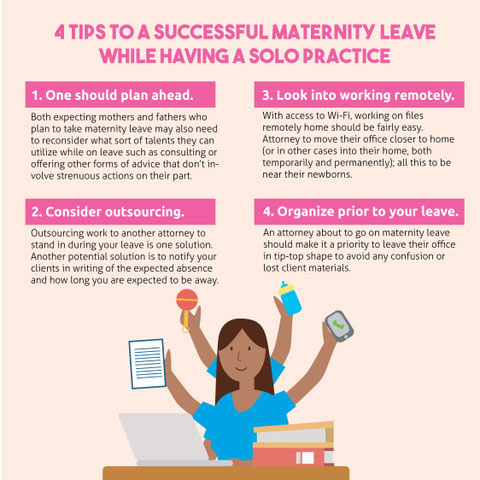
- Maternity leave can be difficult for women (and men) with solo law practices.
- For instance, a person during their maternity leave may worry about how their practices will survive their absence.
- They think about clients, dilemmas, judgments and a whole host of other situations when they should instead be thinking about the family they are either beginning or adding to.
- Either way, while an attorney may not believe there are more important things to focus on than their practice, having a child is much more important.
- But how can an attorney assure themselves that they will have a proper maternity leave in order so that they and their newborn are successfully bonded? Read this article to find out.
No two maternity leaves are alike. What may work for one parent and their child might not work for another parent and their child.
Maternity leave is a very personal experience for a new parent and their child, and for the most part how a maternity leave is handled as well as done is completely subjective.
Of course, there are some aspects of a maternity leave that can be deemed the opposite of subjective, and is instead standard fair before and during a maternity leave.
In the Lawyerist.com article Maternity Leave for Solo Lawyers: Is It Possible? author Kendra Brodin outlines the steps attorneys need to take toward having a smooth and successful maternity that won’t cause them anxiety about their solo practice.
- One should plan ahead.
In Brodin’s article, she suggests that throughout one’s pregnancy up to the delivery date, solo attorneys should plan ahead and/or rethink the types of cases they are willing to accept before taking their maternity leave.
An attorney may decide to pass on new litigation cases with close deadlines that might result in scheduling conflicts.
Both expecting mothers and fathers who plan to take maternity leave may also need to reconsider what sort of talents they can utilize while on leave such as consulting or offering other forms of advice that don’t involve strenuous actions on their part.
- Consider outsourcing while on leave.
Law and pregnancy may not mix due to one simple yet very important aspect of the legal world: deadlines.
Even as associates and counterparts alike may share an attorney’s anticipation of having a baby, that doesn’t mean the legal institution takes a leave from its own dealings.
For example, Brodin explains opposing counsel and the courts may be unwilling to adjust the mother’s or father’s leave schedule. This is why an attorney about to go on maternity leave needs to think far into the future and adjust their schedules accordingly.
Outsourcing work to another attorney to stand in during your leave is one solution. Another potential solution is to notify your clients in writing of the expected absence and how long you are expected to be away.
If you go this route, include in your letter a request for the client’s consent for substitute counsel on their case. Be sure to draft a clear and detailed agreement with a trusted legal colleague – potentially the one you plan to use as a substitute.
Make sure everything is spelled out clearly for the sake of the law firm and the sanity of you and your substitute lawyer.
- Organizing prior to your maternity leave.
An attorney about to go on maternity leave should make it a priority to leave their office in tip-top shape to avoid any confusion or lost client materials.
- All open files should be updated and accurately calendared.
- A case management plan should be put in place; including a timeline for tasks.
- Computer files should be backed up.
- Office equipment needs to be inventoried.
- Insurance policies should be double-checked for relevancy.
All this ensures that upon an attorney’s return from their maternity leave, they won’t go nuts inside a disorganized office space. The less surprises the better.
- Look into working remotely.
Brodin suggests that post-delivery, attorneys tend to work remotely and use computers and cell phones to attend meetings. As most homes now have Wi-Fi access, working on files remotely as well as performing other tasks from home should be fairly easy.
Remember to keep all your computer passwords in order as you attempt to access your law firm from off site.
Another option is for an attorney to move their office closer to home (or in other cases into their home, both temporarily and permanently); all this to be near their newborns.
Other lawyers have an area in the office made especially for the baby, which is fine as long as the baby is not a distraction from their work, or their work a distraction from the needs of their baby.
Conclusion
There is little doubt that a well-planned maternity leave can be achieved with proper planning, outsourcing, organizing, productivity and effort.
As Brodin states, once a pregnancy test reads positive, the parent (or parents) who expect to take a maternity leave should get moving in order to minimize their stress during this time.
Attorneys who plan to take a maternity leave should also network with other attorneys who have successfully taken their own maternity leave.
Use their advice and experience to learn what they learned as well as finding any resolutions or creative solutions.
Most importantly, trust your instincts to spot any weaknesses inside your solo practice. That should include staffing issues, which may cause problems in your absence. This type of assessment in advance of your leave will leave time to fix or strengthen areas you find to be lacking.
Keep a strong support system and a well-defined plan in place. Doing this will make it possible for you to take your maternity leave with confidence that you will return as a new parent to a law practice that has continued to thrive.
For more information, look into these articles:
- The 12 Top Non-Legal Careers For Lawyers Who Do Not Want To Be Lawyers
- Alternative Careers For Law Graduates
- Practicing Law Not The Only Option For Attorneys
- How To Find Alternative Uses For A Law Degree






